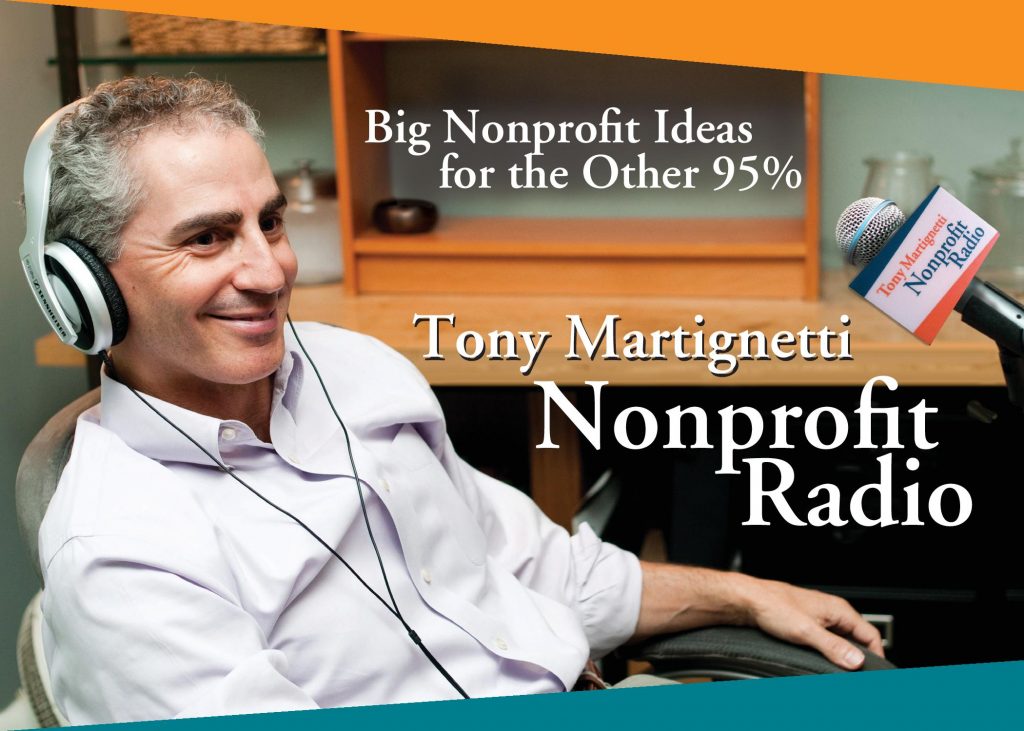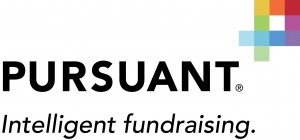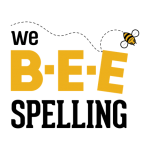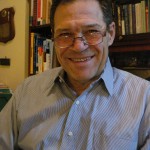I love our sponsors!
Do you want to find more prospects & raise more money? Pursuant is a full-service fundraising agency, leveraging data & technology.
It’s not your 7th grade spelling bee! We Bee Spelling produces charity fundraiser spelling bees with stand-up comedy, live music & dance. It’s all in the video!
Get Nonprofit Radio insider alerts!
Listen Live or Archive:
- On Fridays at 1pm Eastern: Talking Alternative Radio and tune in
- Listen to the July 28, 2017 archived podcast
My Guests:
Scott Stein, Claire Meyerhoff, Gene Takagi, Maria Semple & Amy Sample Ward: 350th Nonprofit Radio
It’s our 350th show and 7th anniversary! With co-host Claire Meyerhoff. We’ve got live music; giveaways from Pursuant & Cura Coffee; all our contributors: Gene Takagi, Maria Semple & Amy Sample Ward; new affiliate station announcements; 2010 Trivia; and a lot more!
Top Trends. Sound Advice. Lively Conversation.
Board relations. Fundraising. Volunteer management. Prospect research. Legal compliance. Accounting. Finance. Investments. Donor relations. Public relations. Marketing. Technology. Social media.
Every nonprofit struggles with these issues. Big nonprofits hire experts. The other 95% listen to Tony Martignetti Nonprofit Radio. Trusted experts and leading thinkers join me each week to tackle the tough issues. If you have big dreams but a small budget, you have a home at Tony Martignetti Nonprofit Radio.
Get Nonprofit Radio insider alerts!
Sponsored by:
Processed on: 2018-11-11T23:45:40.104Z
S3 bucket containing transcription results: transcript.results
Link to bucket: s3.console.aws.amazon.com/s3/buckets/transcript.results
Path to JSON: 2017…07…350_tony_martignetti_nonprofit_radio_20170728.mp3.306379316.json
Path to text: transcripts/2017/07/350_tony_martignetti_nonprofit_radio_20170728.txt
Hello and welcome to tony martignetti non-profit radio big non-profit ideas for the other ninety five percent. I’m your aptly named host it’s our three hundred fifty and show you heard that live music scott stein is with us and lots of other people. Thank you, scotty, you’re welcome. We’ve got two listeners of the week first. Dan kimble he’s, a product specialist at apple, owes software he’s always tweeting and retweeting aboutthe show very grateful. This week, he posted congrats to tony martignetti and his upcoming anniversary show, grateful for you’re and mr show, grateful for your promotion of non-profit work. Dan, i’m grateful to you for your support of non-profit radio. Thank you so much. Congratulations on being a listener the week on show number three hundred fifty also fund-raising fox they’re on the road right now between buffalo grove, illinois and downtown chicago. They tweeted that this will be great road trip listening to which i retorted, this is like an hour trip from buffalo grove to chicago that’s like that’s a commute? Not a not a, not a that’s, not a road trip, but okay, if you insist, maybe in chicago that’s a road trip congratulations. Fund-raising fox drive carefully even though you’re only going across the street, thanks for being with us on three fifty oh, i’m glad you’re with me. I’d be stricken with copper. Oh, poor foreign yuria! If you wet me down with the idea that you missed today’s show, it is the three hundred fifty of show seventh anniversary of non-profit radio coast clear meyerhoff is with us with me live in the studio. We’ve got that live music and more to come give aways from pursuing and cure a coffee all our contributors jane takagi, maria semple and amy sample ward, our sponsor ceos are going to be with us. I’ve got new am and fm affiliate stations to introduce we got non-profit medio math quiz and i’m already exhausted. We’re on facebook live! Check us out right now from the tony martignetti non-profit radio page facebook live! We’re also live tweeting, join us! Use the hashtag non-profit radio on tony’s take two thank you. We’re sponsored by pursuant full service fund-raising data driven and technology enabled, you’ll raise more money pursuant dot com and by we be spelling supercool spelling bee fundraisers we b e spelling dot com tomorrow half welcome back to the studio, tony. Thanks for having me. Thank you. Wonderful to be here for the three hundred and fiftieth show. Thank you. Yes, i love it. You’re the creative producer of the show. Of course. Thank you. I helped you start the show from one back when it was the tony martignetti show for two weeks back in the day two thousand ten also? Yes, of course. There’s a seventh anniversary seventeen minus ten seventh anniversary president of plant giving agency that’s me, you’ll find claire at pg agency, dot com and at claire says z what’s going on climber half what’s up in your what’s up in the pg agency. Well, we’re working on a lot of different projects. I’ve got a lot of wonderful clients and working with parkland hospital foundation in dallas. Cool, a couple of other clients in texas and a couple clients in florida and ah, united way and lots of different people. And i’m staying here in new york for a couple days of my friend bette’s house in westchester county, and i drove into the city this morning with the convertible top down and here i am, cool it’s a beautiful day for a top you drive to scott stein. Welcome back to studio. Thank you for having me. Great seeing my pleasure. Of course. Scott’s dying. The composer of our theme song. My voice is cracked theme song like i’m fourteen cheap red wine of course you’re gonna be playing cheap red wine on dh another wine related song as well you’ll find him at scott stein music dot com don’t go to scott’s stein dot com i did that that somebody it’s an australian motivations motivational speaker don’t go to stop sign dot com go to scott’s in-kind music dot com and he’s at scott’s time music also so glad you’re with us. Great beer. Cool. Cool. Uh, we got, uh we got track record on the phone. He is the ceo of pursuant to years, sponsor of non-profit radio. The renewing way with us to the end of the year. So grateful for that. So so grateful for pursuance, sponsorship and love of non-profit radio trade ryker, welcome to the show. Tony. How you doing today? It’s? Great it’s. A beautiful day for three. Fifty how are you doing in where you from? In texas. Where? You calling from? I’m in the dallas area. The big d. Okay, cool. I want to thank you. I want to thank you so much. Not only for being here today, but for pursuing sponsorship of non-profit radio. Well, tell me, first of all, congratulations. Three hundred fifty episodes. What a milestone. Unbelievable. We appreciate so much. See great work that you and the other sponsors provide the opportunity for you to do for the non-profit states your gift way. Love what you do, and they’re just proud to be a sponsor. Thanks, tony. Thank you so much, trent. Um, you you are so generous at pursuing there’s there’s. This constant resource is available. I mean, i’m talking about them every single week. It’s webinars info. Grams. Content papers? Uh, it’s it’s. Amazing how generous you are. What? What? Acquaintance with what’s coming up for pursuing the rest of this year. Well, a lot going on. Thank you for that. We really believe in giving back the non-profit states in any way. We can. We learn a lot by working with our clients were in partnership with them always. We’re always thirsty. Learn mohr and then share what we learn. Through a variety of webinars and white papers and other things that we do, no matter how large or how small you are, we’re hopeful ableto help some folks out, you know, for the second half of the year, we’ve been working hard on something that over the years we’ve learned things. One of the things that i think most important is that the smaller non-cash profits that don’t have the resources to hyre firms to help him out of that at a deep level, we’re trying to make some of those tools more accessible youand your listeners have known that we’ve been working on that for a while, wade got some exciting things on the horizon to make better sense of all that data out there that that folks have and be able to make that more actionable and getting better results without having that we’re not having to spend a lot of money, so we’re driven by by creating tools, you know, i think that that’s an opportunity out there right now, there’s more competition than ever out there for the same dollars and stay on top of mind for your constituents and being able to keep up. In that to a conversation is really important, and while there are a lot of great point tools out there would like to call them, and we encourage everybody to use things like that that are free or very inexpensive with non-profit states being able to pull that data together being ableto you have the appropriate relevant conversations to your here’s donors and your prospects and volunteers on your advocate, you are really important so that some of the stuff we’re working on cool and, you know, small and midsize non-profits that’s the audience, you know, where we’re big non-profit ideas for the other ninety five percent, and i’m always saying every week, actually, a couple times a week pursuant data driven technology enable ana, i know and that’s that’s a big no that is a challenge area for small and midsize shops. Yeah, not always accessible, i think you know the big non-profits have a lot more resources, and while we appreciate the opportunity to work with them and learn from them, i’m really driven for the drive system for the quote unquote little guy, the small, the medium sized non-profit that’s passionate about what they’re doing and that most of the time spent, you know, driving for the mission of the organization and fund-raising is an important aspect of that, but how do we make that more simple? How do we make it more accessible? How do we make it more affordable? And so i think that the market will be really excited about some of the stuff that we’ll be bringing out twenty eighteen by way of tools to apply all of that. We’re taking the concepts that you hear out there about business intelligence and artificial intelligence, predictive modeling, and we’re going to simplify that to make it as easy as the way you might use google maps and make it easy for the smaller, medium sized non-profit put it to use and to raise more money and more connected to their constituents. That’s what’s really important, excellent trench. Well, i look forward to sharing the word of all that stuff as it comes out with our with our audience with our over twelve thousand growing on die again. I know you’ve got to go and i thank you very much again for your support of non-profit radio. Thanks so much for being with us, trent. Congratulations, tony. And everybody out there keep supporting tony and the great work that he does. Keep up the good work for your non-profit have a great show, tony, and keep up. Keep it going. All right. Cool. Thank you very much, trent. So long. All right. We’re gonna go out for a first break. We got tons more coming up. Oh, my god. We’re just scratching the surface for god’s sake. Stay with us. You’re tuned to non-profit radio. Tony martignetti also hosts a podcast for the chronicle of philanthropy fund-raising fundamentals is a quick ten minute burst of fund-raising insights published once a month. Tony’s guests are expert in crowdfunding, mobile giving event fund-raising direct mail and donor cultivation really all the fund-raising issues that make you wonder am i doing this right? Is there a better way there is? Find the fund-raising fundamentals archive it. Tony martignetti dot com that’s marketmesuite n e t t i remember there’s a g before the end, thousands of listeners have subscribed on itunes. You can also learn maura the chronicle website philanthropy dot com fund-raising fundamentals the better way welcome back to big non-profit ideas for the other ninety five percent reminded we’re on facebook live got some folks with us shout out tio maria simple is there dave lynn, thank you so much. Uh, who else we got? Gary astro cool welcome shoutouts to facebook live! You can join us at the tony martignetti non-profit radio page were also live tweeting used the hashtag non-profit radio. Join the conversation on twitter um, we got a we got to give away let’s do a giveaway we’ve got got coffee gif ts from cura coffee and we’re giving our first pound of coffee too silver mark he’s at this is ah, his twitter idea at silver mark make-a-wish did three hundred fifty is awfully nifty returns of the day for those great things you say i mean, you know that’s, you got to give you got to give some kudos for creativity not great! Those are not great lyrics, but that’s just our okay cheats memorable! I think he may have used it may be recycled. He may have used that for another contest. I don’t know, but that silver mark, thank you so much you’re going to get a pound of coffee from cura coffee and claire, won’t you tell us about your coffee? Cure a coffee directly connects coffee lovers with farmers and families who harvest the finest organic coffee beans. With every cup of courage, you’re joined your effort to expand sustainable dental care to remote communities around the world. We are direct trade, a direct trade coffee company with direct impact brought directly to you, creating organic smiles beyond the cup. Cure coffee, dotcom. Thank you, claire. In that beautiful radio voice, she’s got that. She talked pretty talk pretty good. My abc radio cbs radio serious. You left off serial. I work too serious. Serious. Next time. Don’t be modest. I was then except when they launched on september twelfth, two thousand won cool. Oh, that xero auspicious. That you know that and i get it. You know, again shadow to cure a coffee. Coffee. The ceo is a dentist. He’s practicing dentist that’s. Why? When you get a pound of cure a coffee that’s, why they when you get a compound of your coffee, the gift goes, goes to silver. Mark will include a toothbrush and i think luke’s dental floss. But there’s aural. Care? Yes, because that’s. Why, he says. He says expanding sustainable dental care to remote communities they’re they’re giving back to the communities where the coffee beans are raised. Dental care, they’re giving money for dental care in those communities, communities and in central and south america. On he is a he’s a practicing dentist. He couldn’t be with us. I beg him to couldn’t make it he’s between patients, you know, he’s doing a root canals. You know, it’s got saliva around everything all right? Um, scotty, you cannot i want you to play first song for us. Sure. Um again, scott scott stein, now a pianist, songwriter, vocalist, composer, arranger tell us what you’re gonna play first. I’m gonna play a tune from the record that i just put out just a little bit ago the records called travelling companion and the song is called wine soaked tart we’re keeping ah, wine theme here we do. We got cheap red wine, wine soaked tart. People are going to get the wrong impression of me here, you know, but it’s ah it’s a little tune that way have this idea that as songwriters in his artist we have to be, you know, really down in the dumps to really, like, create great music, you know, you have to really be eo, suffer for your art and it’s not true. It helps it’s, not total teacher. But this is something that is not what kind of zooming out and kind of, you know, being grateful for for what you have i was i was on honeymoon with my wife when i woke up in the middle of the night with the idea for the song, okay? And scott stein, wine soaked heart off his newest album, traveling companion. Dahna i love what you give me. You lying so tired, let me ramble through the square like this september breeze is used to know, nor would you give me your line so tar, let me pull it all together. Then they pull my fuse, paul. Sametz it’s six in the morning and i can’t sleep. It was lying about a strange hotel bed. Buy-in sounds of my lover. Do not keep me waiting. Just the ryland to the rumblings bouncing around inside my head. I what would you give me your wine? So tar, let me revel, sing in the shadow of the spanish hill. You know what, give you wine so let me pull it all together. Limit my fuse part. It’s been a long time coming, but we made it here going to step out on the block, and the noise is going to get off the grid. Tune out everybody but the one i love. Let the world revolve around us like a couple of barefoot kid. Oh, yeah. Love to give me a wine. So tar buy-in let me ram on the land of the authors in the poet it’s on the scene. Lorts give you wine. So tar. Let me pull it all together to limit my bar for my future. Call it predictable. I don’t care. U b roll footage. Cue the montage here. The movie strings. You only get so many years. Be so self aware before the exterior starts to fade in. On this left are the important thing. Duitz because you want forever with a wild, wild heart. What would you give me your line? So tar? So down, breathing him. Don’t try to think so much law to give me a line. So tar, let me pull it all together. My fuse, par. Put my fears apart. Buy-in got stein one so tart thie album is traveling companion. Get the album at scott stein music dot com scottie, thank you so much. Thank you, absolutely love it, love it and there’s more to come. We got we got course, cheap red wine coming up, indulge me while i announce a couple of new affiliate stations. Would you please? All right. W p h w in harpswell, maine live listener love to you. Ah, philly. In effect, i should say affiliate affections to w p h w so glad you’re with us. They’re in the freeport brunswick area of maine, just northeast of portland. Welcome. Welcome to the affiliate community. W p h w also cabe og ki bong ninety seven point nine fm in bandon, oregon. And that is oregon, not oregon. There’s no. E at the end of oregon, oregon offgrid admonished it’s, oregon. Brandon, oregon. There are pacifica station that’s. Very cool on. They happen to be all along the pacific coast in county, oregon. Now, why’re they k bog. I found out k bog glamarys come off cranberries. Very organ is a very big cranberry producing state. Really? And this region of of oregon is bandon is the cranberry capital of oregon. Really cool. Have you been to argue? Okay, bob, i’ve been to oregon. I’ve been to portland. I’m joined a portland for the organ for the first time this october. And then i will only have two states in the us. I have not visited well, that’s very and north when you’re so young through so i need to oh, thank you. I need to get a speaking engagement in alaska and in alaska, north dakota. Okay, that should be well. North dakota is easy, one for you. North dakota sametz least visited st in united states. Listen, alaska people threat well, the glaciers that while there, while we have them, okay, that that’s very cool, you’re going tohave portland. You’re really a great food scene. Great fruiting, love, ah, really quirky place. So our new affiliate stations w p h w and k b o g. Welcome to the affiliate community affiliate affections to those listeners. I’ve got more stations coming up. We got jean takagi on the line. I know we do. Jean takagi is the principle of neo, the non-profit exempt organizations. More group he’s at g tak e ta ke yet it’s. The wildly popular non-profit lob log dot com. Hello, jean takagi. Happy anniversary, tony. Congratulations on three. Fifty. Thank you, man. That’s so cool. Thank you very much. I’m so glad you’ve been with us so so many years from the very early days you were you were one of the very first shows, like you were in, like the first, fourth or fifth show or so and, uh, contributor sense. Really geever it’s been awesome, but you have to come back and visit me here in san francisco. I know. Well, you should come. You know, you could come to new york. I did visit you once in san francisco years ago. But you could come to new york, too. That invitation is open. You could come to the beach in north carolina if you like peaches. That’s tony’s having a big, fat oregon. Maybe we can all meet there in oregon. That’s. Not too far. Yeah, but i’m thinking about a fall trip, actually out west. So i will. I will let you know. Just you know, jeanne, i i emailed this to you a lot, but i want to say it to you. You know, i’m so grateful for the time that you put in for the listeners. Of small from small and non-profit med small and midsize shops it’s a non-profit radio so grateful for the time contribution you make, you know, month after month, you red block posts about the show. When you’re gonna be on, you’re a terrific i just i’m so grateful to have you as our legal contributor. Thank you so much, james. Thank you, tony. Thank you for making all of this information from all of your great contributors available. Teo non-profit sector it’s it’s. Invaluable. Thank you. Uh, what do you got going on, gene? But you got a little little takeaway. Will tip you wanna leave? Leave us with? Sure. You know, i thought i’d talk really briefly about having a politician appear in your charity event. We recently had way did have someone forced chamber. Yeah, it got a lot of attention, so i didn’t talk about that specifically wanted to make sure everybody knew that political leaders can be invited to speak on issues of public policy and issues of importance that charity events. But you’ve got to be careful about it, so make sure you know five oh one see threes aren’t allowed to engage in election. Nearing, so provide instructions to the politicians or their staff, people about not campaign campaigning or speaking on political campaign issues. Uh, you know, at the charity event, and if they start campaigning, you might choose to interrupt politely and strategically, if possible. You know, sometimes that may not be possible if it’s the president of the united states, that might be very, very politically challenging to do that. But afterwards, don’t wait long at the end of the speech of possible make a statement about the charity being a partisans uh, organization don’t wait several days and have the statement come from the top of your leadership. So jean, what is the worst case scenario that could happen to a five a one? C three non-profit if, for instance, a candidate came and super campaigned and broke all those rules and you didn’t do anything about it, what’s what could happen? What’s the outcome right now, the rules say the remedy is taking away its five a onesie three tax exempt status so that’s the rule you know, right now in the political climate, president trump and the republican party platform say that they want to get rid of that rule, but they haven’t gotten rid of that ruled yet, so they would actually like to open up election hearing toe all five, twenty three public charities. But that hasn’t happened yet, and it may never happen. We hope that it doesn’t happen, but the rule right now don’t let it happen because you could lose your tax. Exempt that claire’s got another question for another question. Have you heard about a cherry that has lost its tax exempt status? Because of that? Yeah, it happens pretty rarely and particularly much more rarely. I haven’t heard of any since the new administration. But you would see a handful every year lose their tax exempt status for just that reason. Okay. Interesting. Cool. Very timely topic as always. Jean jean takagi, always on top of things s oh, so grateful, gene. Thank you so much. Thanks. What a pleasure. Thanks, tony. Thanks, clarence. Got have a great thank you. Thanks for your good wishes. So long, gene. We got we got alex career alt-right not not yet. Okay, we’ll get to him. Um, let’s. Um, let’s. Take our little break. Then we got we got we got a little business. Actually, but we have tons of stuff coming up. You still got the math quiz? We got more giveaways. I got morning am and fm stations. We got live listener love coming up. I gotta do the live listening. But look at this for those of us, those on facebook like this list of live listeners amazing it’s a scrolling off the printer, the live listeners we’ve got. And, of course, on the heels of that comes the affiliate affections on the podcast pleasantries, cheap red wine coming up all that first you got to give a shout to pursuant we know them. We just met the ceo but i got eggs. I got to do my promotional thing because i do want you to check them out for the free resource. Is that that trade? And i were talking about infographics, content, papers, webinars. And even even if it’s paid trainings and we have a great prize coming up great grand prize that’s all i am permitted to say at this moment about the grand prize but it’s related to this? Just check them out for resource is tons of stuff for free. They are data driven. It’s it’s. Not just a tagline for them. They help you work with data sorted out, figured out, use it, so you’re not overwhelmed. Check him out. Pursuing dot com quick resource is all the stuff is right there, and we’ll be spelling super cool spelling bee fundraisers. They make millennial money, these air, these air really cool. Claire, they it’s a night for your charity, it’s, live music, dancing, stand up comedy, and they work in fund-raising through spelling bee that’s fun, because millennials are really spelling peer-to-peer. The resident millennial. I feel like i have to confirm this, okay, when you write your lyrics, they’re spelled correctly, yes, what, nobody sigh, and nobody sees them, right. Okay, check out they have a video, they’re really cool. Video show you what a night is like for your charity, it’s, that we b e spelling dot com and then just talked to alexx career, and hopefully we’re gonna be talking to him shortly. And i gotta do tony steak to now, which is my thank you too the way it goes from the people who are just with us today live on facebook hello, thank you for that. But the listeners the over twelve thousand listeners i’m just so grateful that the audience has grown so much in seven years. Thank you, thank you for being part of non-profit radio the trend is always upwards. I’m grateful for that if you let me in your inbox every thursday through the insider alerts, which if you’re not getting them, you can get them at tony martignetti dot com. Thank you for letting me in your inbox every single week. If it’s youtube our fans, their subscribers, they’re on youtube there’s a new video every week twitter, thanks so much for following me reach meeting this show tweeting about the show just enormous, enormously grateful i just got us you know this is an anniversary time to time to say thank you, thanks so much. And speaking of the latest video aside from the three fiftieth which you don’t need now because you got to show you don’t need the previous video, you might check. Out the one that i did most recently before that it was feels good in sixty nine and that’s all i can say about that video, you just have to watch to see what the sixty nine is all about. And, of course, that’s at tony martignetti dot com feels good in sixty nine, and that is tony stick to we got maria simple online. I’ll bet we don’t have a reassembly yet. Wow. Okay, i’ll tell you what, let’s do a little math quiz clay morrow, because i’m really good at math. So exactly, um, and i’m a lawyer. So we picked a non-profit radio math quiz. So you know, we’re gonna sing a song writer writer on dh lawyer, former engineering student i story story for you to bring your slide rule uh, i can not write. Or your engineer, you may need your engineering calculator for those. Ok. Ok. So here’s here’s the math quiz? Because tony’s been doing this show for a long time now, since since twenty ten, it’s a lot of shows that he’s very prolific. We have three hundred fifty shows, so i’d like to kind of figure out some things that some numbers that we’ve accomplished over the years. So would you say how many guests average per show phone and live in studio? Yeah. Live in studio and then plus you gotta bring in the conference guests. I mean, sometimes there’s like three and four panellists. I’d say average. Okay, average, uh, one point seven three let’s. Say two. Okay, let’s round it. So three hundred eighty shows. Two guest per show we have. Who gets it first? How many is that? I hope that i hope that some hope that seven hundred, seven hundred okay, so how many steps are there to climb up the stairs from seventy second west? Seventy second street to the studio here. Oh, you could take the staircase around here. I do it all the time. How many steps? Which is saying? Oh, sam, sam sametz again. Twenty. So twenty steps, times two hundred fifty shows is that’s. Got to be that’s. Gotta be the same. Seven thousand fifty seven thousand. Scott so you did bring a slide rule? I yes. Yes. It’s right in here. All right, all right, all right. So, tony and scott, how many times during each show would you say scott’s music is played during each show. Oh, that’s a cool oh, that’s like how many times is the number one appear on a dollar bill? One, two, three for i’d say it’s probably five. I’m thinking five so what’s time to a two hundred fifty. I don’t know the seven, seventeen, fourteen hundred plus three. Fifteen degree was kottler against that’s got with all right. All right, i swear i’m not i’m not just like peeking over the over the engineering because a ringer is i didn’t know that, it’s. All right? I don’t know. Who’s going to bring her. Okay. How many times have you taken the show on the road? Oh, my gosh! Conferences. Oh, that’s. Probably like, i’m afraid that’s an easy one. Well, ten. So let’s say eleven. So what percentage i can’t even do? The percentage of eleven of the three hundred fifty shows are were shows on the road but you cut me off the delays. I get more than one interview per unconference less now last non-profit technology cover. That was twenty, thirty two interviews in one conference. So there’s thirty two right there, right in three, two and half days. I got thirty two interviews, i’d say probably come away with twenty times eleven conferences. That will be two hundred twenty interviews out of no, that can’t be right. Two hundred twenty. That sounds too high. No that’s. Not right. What am i doing wrong? It’s probably not that high it’s probably it’s. Probably been like one hundred. Oh, those air segments that you’re messing me up. Segments two segments per show. So seven hundred segments. Two hundred let’s. Say, two hundred something two hundred twenty five of those maybe have been conferences or so two hundred out of seven hundred segments. Okay, so the last questions for may out of seven years of shows, i probably come and do it live. Maybe, like, three times a year. So i’ve been here maybe twenty one times. Uh, yeah. In the early days. Yeah. You’re blowing me off in the early days? No, i invited you all time. You never came up? No, i yeah, don’t twenty more. That sounds like a lot. And you know, the last time i was here in the studio, i left tony and i saw another man who works in broadcasting. I met someone. Really? Really. Cool. Right after i left tony show. Oh, you met lester. Lester holt? Yeah, i went down to nbc and lester home. You’ve treated me a picture. You facebook me a picture of you and lester. So today stepped down, you know, the talking alternative studios where we are live on nbc, and then i guess you could go down, continue going down on the show to last. So what are you doing in new york? I said i have clients here and stuff like this came from this non-profit radio show. Oh, and cause i realized later that lester worked in radio. So radio people like even if they end up working in tv or whatever, they still really love stick todo zoho he’s. His eyes lit up when i said, ready brady was cool. Absolutely, absolutely. All right. Thank you, everyone. Thank you for the non-profit. Your math quiz created, produced. This is what she’s, the creative producer. Well, what a surprise. No surprise. Came up with this last night. Like eleven. Thirty my maria semple, decide your simple cold. And i was actually calling on her a little early because she was not at fault when i said maria symbols online, but she is now anyway. Fremery a sample. Hello there, how are you our social media contributor? Immense. I’m sorry prospect restarts contributor. I’m doing great, our prospect research contributors. You’ll find her at the prospect finder dot com and she’s at maria semple on, and she has been a long standing oh gosh, but going back also many years hyre contributor to non-profit radio. Thank you, maria, thank you so much for the time you put in a month after month for our listeners. Thanks so much for my pleasure and congratulations on three hundred fifty and looking forward to three hundred fifty more. Oh oh, my god, they’ll be seven hundred. Okay, i don’t know what i’ll be another seventy years. Oh, my god will be forty. What is that? Twenty, twenty four? Um now cool. Where you now? Where you calling from? Maria semple? I am in new jersey. You’re home in jersey, okay, cool. Very simple loves the new song you facebook live. Do you love scott’s new song? Thank you. Yes, i did. I really liked it a lot. I’m gonna have to go see where i can find it. I think he said it was scott stein music dot com. So i jot that down that’s exactly right. And get the album. Traveling companion. Yeah, she lives out facebook live. All right. Um, summary of you. You got a little tidbit for us today in respect, research land. What do you see? It’s one on there? Yeah, well, you know, i thought it was just kind of focused on teamwork a little bit because, uh, sort of staying in the spirit of, you know, your three hundred fifty shows wouldn’t have happened with without a lot of teamwork there in the studio and from your regular contributors and so forth and all the conferences you’ve attended and really focusing on how important prospect researches to the development process. But that really it’s only one component of the development process on and really try to encourage folks if if you’re wearing that, that prospect research had either as a your sole function within the organization, or maybe one of the functions that you do and your everyday job to try not to work in a vacuum and to try and get a seat at the table. If you can try and see if you will be allowed to attend those development committee meetings and so forth to really play a role in the overall development cycle so that information that you’re able to glean from important conversations can be incorporated into the work that you d’oh alright, it takes a village. It takes a village, is what you’re saying. I think it takes a community text community to raise money and number, and, well, of course, non-profit radio is a part of that, but so is prospect research. All right, the team approach i love thank you for shouting out the team. We do have a great team. We do have an excellent, cool team. I shot them out of the end of every show. Claire scott, sam. Oh, our social media, social media, of course. Social media, susan chavez, all part of the team. Yes, thank you for that. Thank you so much. Cool. Maria, i want to thank you so much again for being part of the show. Thank you very much. And again, wishing you many, many more. Thank you, maria. I gotta give shut out to people who are with us on facebook live. We got we got tons more still. Aunt mary. I know her on david insta with us. Gary astro jimbo xero welcome, jim dahna gillespie rivera ray meyer mary-jo chamberlain michelle libonati oh, my god. Old good friends. Thank you. Thanks for being with us. You could join us on facebook live at tony martignetti non-profit radio page and we’re also live tweeting and use the hashtag non-profit radio. Is that true? That’s true, isn’t it? Um, let’s. See, we got a make on line. Scott. Sam. Any buy-in the line? Okay, then, uh, let’s. Go to i got some new ah, so new affiliate stations and i’d like to welcome. We’ll continue bilich community absolutely am fm stations throughout the country. We got a new one. Que tiene que eighty eight point one fm carbondale, colorado and w c s q one o five point nine fm radio coble skill in upstate new york. I know. That you know, couples skill. Well, i went to plattsburgh state, so i know you would know. Yeah, i know. Yes. Did you know is it’s uh, you know, that’s coble skill, not kabul skill. It’s it was called didn’t know. I didn’t know that i do now, but it’s spelled like kabul, but it’s coble told only one day only one b all right, thank you very much. Like right would be no e at the end of oregon. Okay, you’re right. Couple would be all right. My gobble kabul it’s coble it’s called bilich latto global scale koegler and i’m so glad they’re with us that’s w c s q one o five point nine fm andi i know couple skills. I got a ticket there once. Yeah, it doesn’t. Eighty eight, i think route eighty eight. I don’t know. Interesting fremery take out there, but i’ve got to take a lot of other places in upstate. You got you got a tear, right? Hearing even all the good places. Saratoga, you got a parking ticket right here on seventy second street after one show. That’s a parking ticket that was parking moving violations, or you’re in the big time. Yeah, i did get one. You’re you’re coping skill. I’m pretty sure it was on eighty eight. You gotta hire a lawyer when you get a speeding ticket. That’s the best thing to do. I had to do that once, actually in virginia? Yep. Virginia. You know what? Because anything over eighty, of course, that was not me. I saw it on a sign. But if you happen to be one who was pulled over for dui strike more than eighty is reckless driving. I’ve been there. You get you get a misdemeanor. You know, mr metoo convey. Imagine if you sign the back of that ticket. Mr metoo conviction in virginia for doing over more than twenty miles per hour over the speed limit or over eighty miles per hour. But you could. So i’ve heard you can hire an attorney. You know, they send you letters and for a very reasonable about they’ll take care of it. And the lawyer that took care of mine, i chose his letter out of about twenty letters because his name was will robinson. Oh, cool. Thank will robinson. I didn’t get that was virginia. That was virginia. Virginia. I didn’t get here because i would have picked him through. Thank you. Will robinson? Yes. Be careful in virginia on ninety five. I’ve heard it could be bad. So, yes, eso brand new stations now in main oregon, colorado in new york. So lots of new affiliate affections going out when? When we get to that. So so many affiliates do we have a terrestrial radio? Couple dozen. I really don’t know the exact number. Look where they ended up partying more than twenty. Woman. Twenty. So a score score was more than a score. We gotta score. Plus more than stone. Just don’t get that matthew’s teo what’s that teo give our leaders. Tio penn was that old word for a for a ten cent piece. Whatever a dime in the tie. I can’t remember to bits. We got to bet your two bits worth of that isn’t isn’t cubine oh, is it that those dying what’s two bits i don’t want it was a dime. Now two bits a quarter. We’re almost a two bit we could were around to putting wimpy say, it’s worth burglar hamburger um okay, let’s. See, uh, i want to i want to. Do some more music. Yeah, i’m ready for more music. Scotty stein. Oh, it’s, time for the time, for the theme of non-profit latto now, this is this is legit. I never stole this music from scott start. We have, we have no way of really license, license and he’s been with the show ever since. It’s a couple of years now, you know, i didn’t go back and look at when the licensing agreement started, but if you have been a few years, yeah, cheap red wine, this is scott’s dying cheaper what what’s the album, the cheaper ones snusz from a two thousand nine record, i did called jukebox and get their jukebox. I’ve seen him live ilsen him in and bars clubs. I’ve seen him do cheap red wine a few times. Scott stein, the theme song for non-profit radio, cheap red wine, all right. To be, they just keep on talking sooner. Later, i figure around just so what you mean. You see, in romantic advice from a village, i’m looking for answers upon a tv screen. Buy-in wait can agree on nothing. We can’t tell our ups from our downs. We’re disappointed in each other. Nothing baby. And i love that we have found. You know, you used to find me charming, but i can’t figure out how. And you said you thought it was handsome. But doesn’t matter now. So keep falling. Five foot sounds as long as your time. Well, because i haven’t got any promises about a cheap one and down. You know, some girls live in diamonds. And they won’t talk to the cut of clothing that i wear. Well, i’m reporting for the good stuff, and you’re too easily distracted to care, relying got too many options, and so i’m gonna do the best that i can, but you have some competition one day when i’m a wealthy man said, you know, you used to find a job, but i can’t figure out how you see your toes, and it doesn’t matter now. So came falling from my post as loans. Your time will allow, because i’ve got a runny promises by achi, brenna wine and wait let’s, raise the glasses. You drink the better days. The other people’s kids are. They don’t like the things we say, and i’m thinking, because of everything that i want flash nothing. Three signs his work permit for each other, as long as with you, nobody else in my nobody’s way. What? You know, you used to find the jumping, but i can’t figure out how and you see, your father was handsome. Never mind it. Don’t matter now, so get for from a punch on monday, tom. Allow about her any promises, a cheaper one. Teo. Yeah, man, that song is under my skin. I can’t help it. I just love i just love cheap red wine from the first moment i heard i knew it had to be the thing that theme song thank you so much. Thank you for your, you know, for communion to have me on and getting congratulations every fifty and, uh, you know, supporting local independent music. Absolutely. Absolutely love it. Thank you. I’m glad you’re part of the show chanpreet out every time. Every time we got we got alex career alex were called and he’s the ceo of we’d be spelling you hear me? Talk about it every single every single week. Super cool spelling bee fundraisers we be spelling dot com. Hey, alex. Career. Hey, what’s up. Tony, how you doing? I’m doing great. How are you? I’m doing fantastic. Thanks so much for having me on for the three hundred and fifty of the exciting stuff. Absolutely. I just wanted to hear you tell people. You know, in your own words what we be spelling is all about, and i’m grateful that you’re part of the show week after week after week. So, you know, give us give us the short version. What? What? What tell me about we’d be spelling absolutely. So we’d be selling the lifetime of game show. We have a live band with comedian judges. What we do is we take this wacky event repair with non-profit and we use it a za fundraiser. So we start peer-to-peer campaigns with all of the spellers. They raised a bunch of money like marathon runners in the lead up to the event. And we come together. We have ah, party of an event that it’s spelling bee only in name, but feels a lot more like comedy. Game show. Yes, cool! I love that it’s all it’s, all entertainment i’m you know i’m always saying, is that it’s not your seventh grade fundez not your seventh grade spelling bee, not you. It is not your grandmother’s, not your grandmother spelling that. What do you got coming up? Anything exciting? Going share? Yeah, so we’ve been really busy this year. We’ve been doing about two to three events a month from the top of the year axel next big event is august twenty third in brooklyn were going to be part of the brooklyn comedy. Festival so that’s a really fun event we’re partnering with. They tell you to raise the money at a big event with a whole bunch of comedians participating in fellers that august twenty third at union pool in williamsburg, brooklyn. Excellent. Excellent. Yes, and it’s a night for your charity, it’s ah, it’s fund-raising for your charity individually. S o you know, check out the video. We be e spelling dot com and then just talked to alexx. I mean, you could see what a what a what a cool guy is, right? I mean, it’s, no trouble. No trouble. All right. Appreciate it, alex. My pleasure. Thank you for calling in. Thanks so much for being part of the show. For your sponsorship. Of course. In two to three hundred fifty and three hundred fifty more shows. Thanks so much. Thanks so much. Let’s. Go teeny sample war. Who? Thank you. Thank you. Alex let’s, go to any sample ward. I know she’s on. Hello, amy. Sample ward. How are you? Hello. I’m doing well. Congrats on three. Fifty. Thank you. Aimee semple ward, our social media contributor. Ceo of intend the non-profit technology network. She’s at amy rs. Ward the ours for rene. Um and thank you so much. Thank you. Thank you. Yeah, i can’t believe that. I mean, i remember five years ago getting to be on the show. Can you believe that it’s been five years? I know you were on your guest on the one hundredth. You’re a guest on the one hundred, and then i just fell in love with the whole idea of prospect of sorry mixing him up social media and being on the show every single month. And, uh, yeah, two hundred fifty shows ago. It’s. Amazing. I know. Five years. Absolutely. So. So, you know, there are there were tools that didn’t exist five years ago that now we get to talk about on the show. Indeed, there were indeed there were so glad so. And let me say to you, i am grateful for the time that you put in every month to educate non-profit radio listeners in small and midsize non-profits thank you so much. Amy really means a lot to me. Thank oh, my god. It’s. My pleasure to get to share. Cool. Thanks. You give us. We just got a minute or so. Give us something you’d like to share. Well, one thing that i was thinking about that i will not put any any political commentary around, but i was reflecting earlier this morning about being on the show, talking about social media five years ago. And would we have ever thought five years ago that we would have politicians using the same tools that organizations are using right, like, five years ago, it was such a difference reality when it came to that, and now it’s normal, that articles would be quoting a tweet or a facebook post or facebook live stream, you know, from from d c i think it’s really interesting what that will mean going forward? Yeah, i think five years ago, politicians were just kind of figuring out whether twitter is something they should put their name on, is it? Is it safe for me to be associated with this platform now? It’s zits fundamental and you’re way behind if you’re not, you know? Yeah, i mean, we have, you know, elected officials using facebook live stream when there, you know, doing presentations on the floor, how does that change their relationship to their constituents? I think i think it would mean a lot. Get shifted pretty quickly. Okay, cool. Wait, what did you have something you want to know? We got it. Okay, we gotta let me go and we’re happy. Three. Thank you, thank you so much. Thanks for being part of the show. Amy. Of course. Thanks, amy, and we got to go to a break. When we come back, we’ve got got more giveaways. We got live. Listen, love podcast, pleasant she’s, an affiliate, affections. You gotta hang around, stay with us. Like what you’re hearing a non-profit radio tony’s got more on youtube, you’ll find clips from stand up comedy tv spots and exclusive interviews catch guests like seth gordon. Craig newmark, the founder of craigslist marquis of eco enterprises, charles best from donors choose dot org’s aria finger do something that worked neo-sage levine from new york universities heimans center on philanthropy tony tweets to he finds the best content from the most knowledgeable, interesting people in and around non-profits to share on his stream. If you have valuable info, he wants to re tweet you during the show. You can join the conversation on twitter using hashtag non-profit radio twitter is an easy way to reach tony he’s at tony martignetti narasimhan t i g e n e t t i remember there’s a g before the end he hosts a podcast for the chronicle of philanthropy fund-raising fundamentals is a short monthly show devoted to getting over your fund-raising hartals just like non-profit radio, toni talks to leading thinkers, experts and cool people with great ideas. As one fan said, tony picks their brains and i don’t have to leave my office fund-raising fundamentals was recently dubbed the most helpful non-profit podcast you have ever heard. You can also join the conversation on facebook, where you can ask questions before or after the show. The guests were there, too. Get insider show alerts by email, tony tells you who’s on each week and always includes link so that you can contact guests directly. To sign up, visit the facebook page for tony martignetti dot com. Lively conversation. Top trans sounded life that’s, tony martignetti non-profit radio. And i am his niece, carmela. And i am his nephew, gino. Ah! My niece’s name is carmela. Come on, that was carmela and gino metal, niece and nephew there. Now they’re not yet there. Now thirteen and eleven, they’re italian. Let’s, give something right there. A little talent, let’s. Give something away. I got some more cure a coffee. Um and this time it’s going to seth perlman. Ah he’s at s j perlman p r l m a n and he tweeted better, brighter, bolder broadcasts for those who give back yeah, you know that’s an attorney that’s, that’s that’s about what you’re gonna get. You know, i know it’s great just writing for a living. No such problem not very good and i’m grateful for him tweeting out and using the hashtag non-profit radio three fifty for today’s show. So we’re sending him a pound of bolder kira coffee for seth perlman. Claire cura coffee directly connects coffee lovers with farmers and families who harvest the finest organic coffee dean’s. With every cup of cure, you join our effort to expand sustainable dental care to remote communities around the world. We are a direct trade coffee company with direct impact brought directly to you, creating organics miles beyond the cup. Cura coffee dot com your coffee dot com love them. Thank you so much, cura, for sponsoring those two giveaways and we got a grand prize to give. Away the grand prize is going to cheapen cole she’s at non-profit chapin and she tweeted for today’s show congrats to tony martignetti on celebrating non-profit radio three fifty seven years of enriching inspiring content on an amazing podcast exclamation mark thank you! Thank you so much. We got the grand prize for you and that is a seven part webinar training siri’s sponsored by pursuant are our sponsor. I hope they’re not at their sponsoring. Too many eyes not distribute the sponsorship dollars too broadly. I mean, don’t forget non-profit radio for god’s sake. Claire, what about that? What about that seven port? Serious? Well pursue it is proud to sponsor a seven part webinar siri’s with some of the world’s top fund-raising experts, including gael perry from fired-up fund-raising the donor relations guru lynn wes for simon scribe er from change fund-raising leah eustis s f r ee and founder of blue canoe see change strategies founder mark rovner and a rachel muir c f r ee what’s that stand for cfr certified fund-raising executive and then there is also a c f r ee what’s that advanced certified fund-raising and then there’s and then there’s double advance. D a c f r double advanced, which and then it has an asterisk at the end too. And then you drop a footnote at the bottom of the page and it says that you’re super sort of fundchat yes, so go for the cfr, which i just made up. In fact, it looks like dale perry. Looks like cal perry just joined us on now. Hey, just join us on facebook. Hello, gail pantry. So joined lisa martin game and joined hello, lisa. Jeff lane joined wow, let’s vote for lots of friends from and vot nor the value altum pan high school. Thank you so much, jeff. Lisa um, panda reso mary-jo chamberlain didn’t realize this show had so much math. Now, this is a special because it’s got a three, five zero in the title. So not to worry come back and not a lot. Nothing so much math every time greg rajic am i going to saying no, no, i was left thinking you did mind you don’t mind my lip sync when you were singing it all now and listen if you want to sing harmony like you know what does that mean? I have jack in jail, jack in jail, not proper radio jock in jail, i don’t know. Not sure harmony is normally the lyrics is that what the lyrics is now it’s like when you sing, when people sing together, one sings like the team, the melody and the harmonies, like another part, like the background, or sometimes what’s the lyrics what’s that what’s that i hear the words that’s, the word zoho fancy way to say it works the melodies, the tune this is why i have drug in jail. Um, i like to write the words first and then i do the lyrics after let’s do live listen alone using one minute. So what? The end of the show home? My god, no, no, alright, live! Listen love, i can’t do i can’t doing languages look at this live love! I’ve got to get out besides everybody on facebook, shalem, malaysia, seoul, south korea padano dune yano, italy thanks for being with us. Italy, brazil, austria, germany non-cash yang, china let’s bring it into the u s new york, new york multiple in new york city, potomac. Marilyn brooklyn, new york. Stuart scott stein, who hails from oakland. California. Madison, wisconsin south orange, new jersey. Swan’s bar in north carolina, whoa! Swan’s morrow, mendham north, new jersey, woodbridge, new jersey. New winds or new york. Tampa, florida st louis, missouri hyre hobson, houston, texas live listener love i got into the ophelia affection before you cut me off. Sam, i am and fm stations throughout the country. So glad you’re with us. It’s the affiliate affections. Thank you for being part of the show and the podcast pleasantries. I’ve got to go out to the over twelve thousand podcast listeners. I am grateful you are with us. Sam is cutting me off. I wish i could be more effusive. We got to go. Duitz snusz stein. Claire meyerhoff. Thank you so much for being with you. Thank you. Thank you. Being with me for three. Fifty next week. Personalized philanthropy. Steve myers wants your fund-raising to be seriously, really donor-centric he’s with me for the hour. If you missed any part of today’s show where i beseech you, as i do every week find it on tony martignetti dot com. We’re sponsored by pursuant online tools for small and midsize non-profits data driven and technology enabled and by we be spelling supercool spelling. The fundraisers we b e spelling dotcom are creative producers. Claire meyerhoff sam league rules is the line producer shows social media’s by susan chavez. Our music is by scott stein of brooklyn. You with me next week for non-profit radio. Big non-profit ideas for the other ninety five percent. Go out and be great. What’s not to love about non-profit radio tony gets the best guests check this out from seth godin this’s the first revolution since tv nineteen fifty and henry ford nineteen twenty it’s the revolution of our lifetime here’s a smart, simple idea from craigslist founder craig newmark yeah insights, orn presentation or anything? People don’t really need the fancy stuff they need something which is simple and fast. When’s the best time to post on facebook, facebook but andrew noise nose at traffic is at an all time hyre on nine a, m or p m so that’s, when you should be posting your most meaningful post here’s aria finger ceo of do something dot or ge young people are not going to be involved in social change if it’s boring and they don’t see the impact of what they’re doing. So you got to make it fun and applicable to these young people look so otherwise a fifteen and sixteen year old they have better things to do if they have xbox, they have tv, they have their cell phones. Me dar is the founder of idealist took two or three years for foundation staff to sort of dane. Toe add an email address their card it was like it was phone. This email thing is fired-up that’s why should i give it away? Charles best founded donors choose dot or ge somehow they’ve gotten in touch kind of off line as it were and and no two exchanges of brownies and visits and physical gift mark echo is the founder and ceo of eco enterprises. You may be wearing his hoodies and shirts. Tony talked to him. Yeah, you know, i just i i’m a big believer that’s not what you make in life. It zoho, you know, tell you make people feel this is public radio host majora carter. Innovation is in the power of understanding that you don’t just put money on a situation expected to hell you put money in a situation and invested and expected to grow and savvy advice for success from eric sabiston. What separates those who achieve from those who do not is in direct proportion to one’s ability to ask others for help. The smartest experts and leading thinkers air on tony martignetti non-profit radio big non-profit ideas for the other ninety five percent.













